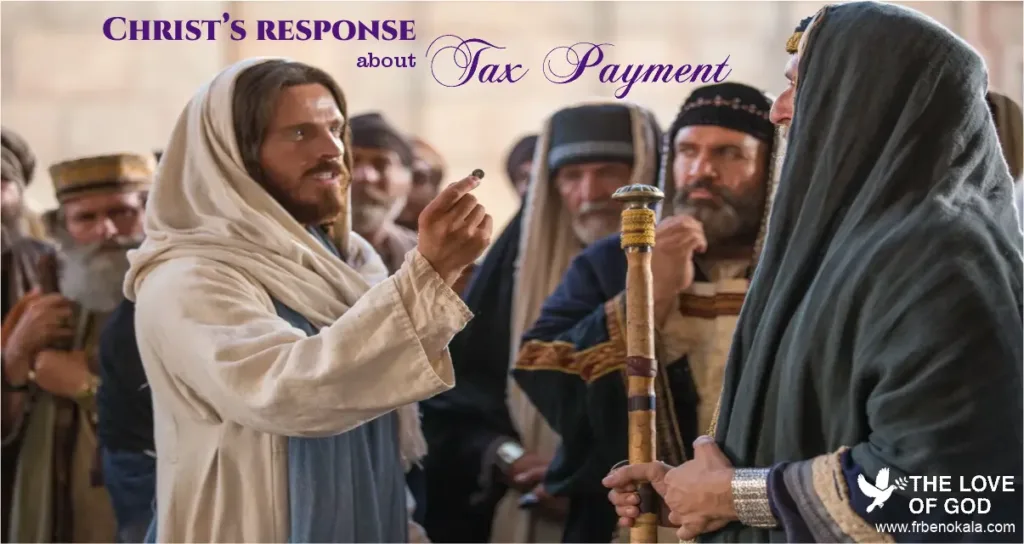HOMILY OF 29TH SUNDAY IN ORDINARY TIME, YEAR A
1ST READING: Isaiah 45:1, 4-6; 2ND READING: 1 Thessalonians 1:1–5; GOSPEL: Matthew 22:15–21
Accountability, honesty, transparency, etc. are the hallmarks of good governance and prerequisites for peace, unity, growth, and development in society. These are the civic qualities everyone should possess (both leaders and followers) in order to be responsible citizens. But when they are lacking, then corruption ensues, and the fate of that society would be in a quagmire.
The Authority to Govern the Citizens comes from God
The authority to govern people in society comes from God (Romans 13:1–7). State authorities have the right to receive obedience and cooperation in all matters that promote the material welfare of the state, as long as they do not inhibit the spiritual welfare of their members.
God Chooses Responsible Citizens, Despite Opposition, to fulfill His Plans
In the first reading, God chose Cyrus, a Persian king (pagan), as His anointed instrument to carry out His divine plans of liberating the Israelites from captivity. Although he was not a citizen of Israel, he collaborated with God in rebuilding His ruined temple in Jerusalem (Ezra 1:1–11). This shows that God is indeed the Lord of the universe and can use any responsible citizen to actualize His salvific mission, even those from different countries.
However, the Pharisees never collaborated with Jesus Christ; instead, they were always opposing and plotting how to entangle Him. This is evident in today’s gospel when the Pharisees’ disciples and Herodias came with subtle words of flattery to question Jesus Christ about the legitimacy of paying taxes to Caesar.
Christ’s Wise Response Regarding the Citizens’ Tax Payment in Society

Certainly, if Jesus Christ had said yes, He would have offended the Pharisees who abhor tax payment. This is because, for them, God was the only King (theocracy). To pay tax to an earthly king was to admit the validity of his kingship and thereby insult God. If Jesus Christ had said no, then He would have offended Herodias, who would have reported Him to the Roman authorities. Hence, His mission would have been thwarted.
However, Christ’s wise response, “Give to Caesar what is due for him and to God what is due for Him”, though widely misconstrued, underscores the supremacy and priority of God. Also, other constituted authorities deserve loyalty as long as they do not interfere with the worship of God. With this in mind, citizens can comfortably carry out their civic responsibilities.
Challenges in Fulfilling Civic Responsibilities
Unfortunately, the economic situation in our contemporary society has engendered corruption as well as numerous irresponsible activities. Sometimes, authorities do not provide the basic amenities that motivate citizens to fulfill their civic responsibilities.
Consequently, many people in society, especially Christians, have become irresponsible citizens. A good number of them do not pay their taxes, but they criticize those in authority for bad governance. Moreover, some of them, despite being deficient in their civic responsibilities, always employ destructive criticisms to sabotage the efforts of those in authority (Ecclesiastes 10:20; James 3:10–17).
Besides, some who are at the helm of affairs (leaders) extort excessive taxes from the citizens (followers) without using them judiciously. Nevertheless, these should not dissuade us. We should strive to fulfill our obligations while also advocating for accountability, justice, equity, and fairness in the use of public funds (2 Corinthians 8:20–21).
Christian’s Dual Citizenship and Responsibility to obey Constitutional Authorities

We, as Christians, must obey the constituted authorities in our respective countries. Just as the scripture says, “Let everyone be subject to the governing authorities, for there is no authority except that which God has established” (Romans 13:1). We base this command on our trust and submission to God’s sovereignty. Also, recognizing that God has established these authorities for our good and the maintenance of order in society.
Undoubtedly, Christians have dual citizenship: earthly and heavenly. Hence, we must be responsible citizens who contribute positively to the growth and development of our society and that of the Church. Like the Thessalonians in the second reading, our work of faith and labour of love should be active and sincere.
Our Responsibility to Promote Societal Norms and Values
It is our sole responsibility to contribute our quota to promoting societal norms and values. We can achieve this by being accountable, honest, transparent, and faithful when carrying out our duties. This is part of our responsibility in society as Christians.
Finally, since a Christian is a person of honour, we must be responsible citizens; failure in good citizenship is also a failure in Christian duty. Therefore, our service to God should complement our service to our neighbour. Both are inseparable.
Prayer:
May the Almighty God give you the grace to become a responsible citizen. May you always carry out your civic duties with love, honesty, transparency, and faithfulness, through Jesus Christ our Lord, Amen.
Peace of Christ be with you…
Rev. Fr. Ben Okala, C.S.Sp.




